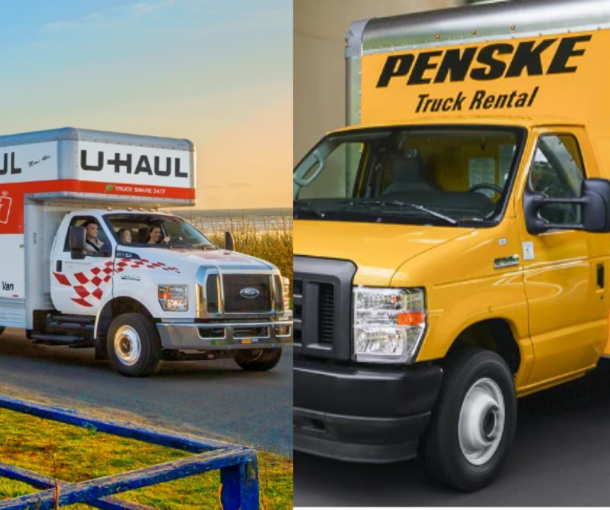How Much Does It Cost to Move? [With Moving Quotes]

If you’re planning a move, it’s essential to understand the various types of moving costs you may encounter along the way. Considering these expenses and options, you can better prepare your budget and make informed decisions.
In this article, we’ll explore the most common moving costs and options that many people must take into consideration when planning a move. How much does it really cost to move?
Types of Moving Costs
These are some of the most common moving costs and options that many people must consider when planning a move.
| Moving Service Type | Average Cost | Details |
| Hiring Professional Movers | $800 – $2,500 | The cost depends on the hourly rate they charge and the number of movers |
| Renting a Moving Truck | $20 – $3,500 | This cost depends on how long you need it for and the size of the truck |
| Rent a Moving Container | $700 – $7,500 | The cost varies greatly depending on the moving distance and size of the container |
| Hire a Full Service Moving Company | $2,000 plus | You will typically pay at least $2,000 for a full-service moving company, but the cost varies depending on square footage and moving distance |
How Much Do Movers Cost?
The average cost to move can vary depending on multiple factors, such as moving distance, whether or not you have a full-service moving company, the amount of belongings you need to move, and labor costs.
A local move costs an average of $1,250, and a long-distance move (1,000 miles) costs an average of $4,890. These average moving costs are based on a move of a 2 to 3-bedroom home, with a load of about 7,500 pounds. To get an approximate cost to move cross country or an approximate cost of a local move, a moving cost calculator can help you get a better idea of what your move will cost.
Cost of a Local Move
The average cost of a local move is around $1,250, but that cost can increase or decrease depending on the size of your home and how many items you need to move.
| Studio or 1 Bedroom | 2 to 3 Bedrooms | 4 to 5 Bedrooms |
| $500 – $1,000 | $950 – $1,750 | $1,900 – $3,000 |
Cost of a Long-Distance Move
The typical long-distance moving cost of about 1,000 miles is $4,890, but this cost can increase or decrease depending on how many items you need to move, how many miles you are moving, and the size of your home.
Cross-country movers cost more than local movers because long-distance moving companies must consider tolls, gas prices, and compensating drivers. In addition, the cost of international movers costs even more, as it includes transportation, customs, and delivery fees.
| Number of Miles | Studio or 1 Bedroom | 2 to 3 Bedrooms | 4 to 5 Bedrooms |
| 250 | $1,100 – $2,300 | $2,250 – $4,350 | $4,100 – $5,600 |
| 1,000 or more | $1,400 – $3,050 | $3,100 – $6,000 | $6,350 – $10,000 |
| 2,500 or more | $1,900 – $4,300 | $4,200 – $8,550 | $9,500 – $14,110 |
How Much Do Movers Cost Per Hour?
Professional movers usually charge between $25 to $50 per hour for a local move. Long-distance professional movers can charge between $50 and $200 per hour based on the time, distance, and rates.
| Size of Home | How Many Movers? | How Many Hours? | Average Cost of Movers |
| Studio Apartment | 2 | 2 | $215 |
| 1 Bedroom Apartment | 2 | 4 | $425 |
| 2 Bedroom Apartment | 3 | 6 | $955 |
| 3 Bedroom House | 4 | 7 | $1,485 |
| 4 Bedroom House | 4 | 9 | $1,910 |
| 5 Bedroom House | 5 | 12 | $3,185 |
Factors in Determining Moving Costs
There are many factors that you must take into consideration when determining moving costs. It is necessary to include these factors, as they affect the cost of moving.
Distance of Move
The distance of your move greatly affects how much your move will cost. If your move is local, it will cost much less than a long-distance move of 1,000 miles or more. In addition, there are fewer additional moving company costs with local moves, like toll fees and gas prices.
Long distance moves will cost more because the movers must be compensated for the long distance and make additional stops for tolls and gas.
Labor
Labor costs will determine the cost of your move, which can fluctuate depending if you have a local or long-distance move. Depending on your moving distance, movers typically charge anywhere from $25 to $200 per hour.
The labor costs can also change if you have fragile or heavy items that need to be moved or if there are numerous stairs.
Size of Moving Truck
Moving trucks come in several sizes, and the size of the moving truck you need is estimated based on the size of your move. For example, a studio or 1-bedroom apartment may only need a small moving trailer, while a 4-bedroom home will likely need a 26-foot moving truck.
You can use a moving container instead of a large truck to get the lowest cost for a small move.
Moving Supplies
You will most likely need to purchase moving supplies to prepare for your move, such as cardboard boxes, bubble wrap, plastic bins, packing paper, or other materials you need to move. You will need these supplies for packing purposes to prepare for your move.
House Size
The size of your home is an essential factor in determining the cost of your move. If you have a 5 bedroom home instead of a 3 bedroom home, it will cost more because the move will take longer. The more belongings you need to move, the more it will cost.
Time of Year and Day of the Week
The time of year and day of the week can significantly impact the cost of your move. It is less expensive to move on a weekday instead of a weekend. In addition, moving in the winter will cost less than moving in the summer, as the months between April and September are the peak moving season.
Need Movers? Your Move, Your Choice

Instant Exact Cost for Your Specific Move
Agoyu’s AI technology give you quick, precise estimates. Scan your room, receive instant quotes from multiple movers, and confidently select the best option for you.
STEP 1 OF 3
STEP 2 OF 3
or Have a Top Mover Call Me Now!
Do it the old fashion way! A top mover will call you to provide an instant quote over the phone or at your house!
How Much Does a Moving Company Cost? Additional Moving Costs to Consider
While there are typical factors to determine the cost of your move, such as moving distance, labor costs, size of the moving truck, moving supplies, house size, and time of the week and year, there are additional moving costs you should also keep in mind to prepare for your move.
Insurance Coverage
When using a moving company to help with your move, you most likely will need to purchase liability coverage. Many moving companies offer different types of liability coverage, like Basic Release Value Protection and Full Value Protection. You may also want to buy additional insurance if you use a third-party provider for your move.
Specialty Items
There will likely be an additional cost if you need to move any specialty items, such as a hot tub, piano, grandfather clock, or valuable artwork. Movers need to charge more to move these items because they are very heavy or difficult.
Amount of Belongings You Need to Move
The cost of your move depends on the amount of belongings you plan to move. For example, if you have enough belongings to fill a 4-bedroom home, the cost will be more than if you were to move to a 2-bedroom apartment. Getting rid of any unnecessary items before your move can help decrease the cost of your move.
Packing Services
If you choose a moving company with full-service packing, the cost will be more than if you choose a moving company with partial or no packing services. The additional time and effort the movers would put into packing and moving your belongings would cause the cost to rise. In addition, unpacking services will also be an additional cost.
Storage
If you have a complicated moving situation, you may need a storage service to hold your belongings for a certain amount of time after your move.
Storage services cost an additional fee, which can increase the longer you need to keep your belongings in storage. However, storage rates vary depending on the moving company, so asking about their storage fees when planning your move is helpful.
Other Fees to Consider
These are some other fees that often get overlooked when planning a move.
Stair Carry Fee
A stair carry fee is an additional charge that a moving company will charge you when the movers need to carry your belongings up or down several flights of stairs. This fee usually only applies when the movers need to move belongings up or down multiple stories.
Elevator Fee
If you are moving into a building with an elevator, such as a high-rise apartment building, you can be charged an elevator fee. You will be charged an elevator fee because it takes the movers more time and energy to load and unload an elevator than it does to load and unload your belongings straight from the building to the moving truck and vice versa.
Extra Stops
You can expect to be charged more if your professional movers need to make additional stops. This cost depends on how many extra stops the movers need to make. For example, if your movers need to stop at your storage unit to pick up any items on the way to your new location, it will be considered an extra stop, and you will be charged a fee.
Shuttle Fee
While not all moving companies offer shuttle services, some do. A shuttle service is typically needed if your moving truck cannot park near your home. For example, if your home is located in an area without ample parking space, you might need to use the shuttle service to transport items from your home to the moving truck.
Tipping
Even though tipping is not required for your movers, they greatly appreciate it. Tipping is an excellent way to show your movers that you appreciate their hard work, but you should only tip in cash. A good rule of thumb is to tip your movers between $5 to $10 for each hour per mover.
How Much Does It Cost to Move – FAQs
Can moving costs be deducted from my taxes?
Moving costs can be deducted from your taxes, but it’s important to note that the tax laws surrounding this deduction have changed recently. The deduction for moving expenses is no longer available for most taxpayers. However, there are exceptions for members of the military on active duty and certain moving expenses related to a job relocation.
How do you budget for a move?
When budgeting for a move, you can take several key steps to ensure that you plan and allocate your resources effectively. Here’s a step-by-step guide on how to budget for a move:
- Estimate your moving expenses
- Obtain quotes and compare prices
- Create a moving budget spreadsheet
- Prioritize your expenses
- Account for additional costs
- Review your current budget
- Save and allocate funds
- Track your expenses
- Prepare for unexpected expenses
- Review and adjust as needed
Is $5,000 enough to move?
The sufficiency of $5,000 for a move depends on several factors, including the distance, the size of your household, the level of assistance you require, and the location you are moving to. While $5,000 can be a good starting point, it may not cover your moving expenses. Here are some factors to consider:
- Distance
- Household size
- Moving services
- DIY vs. hiring professionals
- Additional expenses
Can you negotiate moving costs?
Yes, it is possible to negotiate moving costs with moving companies. When planning a move, obtaining quotes from multiple moving companies to compare their prices and services to find the best cheap movers is beneficial. This information lets you negotiate with the moving companies to secure a better deal.
Final Thoughts
So, how much does it cost to move? Understanding the various moving costs is crucial when planning a move. You can better prepare your budget and make informed decisions by considering factors such as packing supplies, moving company fees, transportation expenses, storage costs, insurance, and additional services.
Using the Agoyu moving app can help you compare the cost of the best moving companies and read mover reviews. Check out Agoyu today to get started on planning your move.


